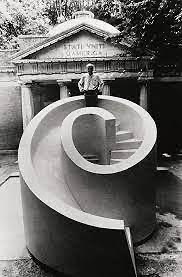Circuitous

Isamu Noguchi: Slide Mantra (1986)
" … one dare not ever engage in that kind of work anymore."
In this culture, we possess highly evolved methods for streamlining, for 'making efficient.' These tactics underpin what we refer to as Process Improvement, presuming that one improves processes by trimming them down to bare minimums. We prefer methods requiring less time, fewer resources, smaller investments. We're all in for quick and easy, and even feel uneasy when something doesn't seem quick or easy enough, for it seems broken then and in need of 'improvement.' Some activities, however, do not. by their nature, lend themselves to such streamlining. I wrestle with these jobs because efficiency mantras reverberate in my head when I engage in them, telling me that something's wrong, a false positive warning when working with Circuitous processes like Authoring. ©2022 by David A. Schmaltz - all rights reserved
I have not yet found the straight or the narrow paths through my Authoring effort. It seems as though I'm still chasing rainbows, distracted to the left and then to the right, up, then down. I cannot seem to maintain the sharp, laser-like focus common to truly efficient processes. It might be that Authoring's not amenable to Tayloring down into the common patterns, that Authoring naturally entails shifting between foci rather than batching similar activities together, as Frederick Winslow Taylor, the self-proclaimed Father Of Scientific Management, prescribed. It consequently seems as sinful as eating ice cream for breakfast to engage in Authoring work, as it feels like a moving violation of what real work, professional engagement, really should be. I seem to have shown up for Authoring in pajamas and slippers.
Because Authoring seems untamed, I find it difficult to find satisfaction from engaging in it. I feel that rush accompanying a sense of progress when I print off another collated manuscript, three hundred and fifty-six pages, rhythmically double-siding, accumulating into a tidy pile I must remove from the output slot about halfway through the job because that slot's only big enough to handle about half the pages in that job. The pages feel warm and the printer smells like an over-worked toaster, and I sense real progress as I heft the result. Then I remember why I printed off that pile and see the other two piles I printed off before this last set and I mentally calculate that I'll be up late reading through those pages, that I just performed a Go Back To Go, Do Not Collect Two Hundred Dollars act on my grand Authoring Monopoly board. I'm literally headed back to page one again and destined to march through to page three hundred and fifty-six again, whereupon arriving, I'll be focusing again on another page one again, but that this time through I'll be focused upon somehow reaching page three hundred and sixty-two.
I read words one at a time no matter how many times I've read them, which seems like anti-progress, anti-learning. Everything seems to stand in the way of everything else. Authoring, at this point, seems like a giant game of Pick-up Sticks, where everything seems to be leaning into or onto everything else, and my job entails removing each stick without upsetting any others. It's tedium every inch of the way, with even more tedium promised as a reward for successfully surviving tedium. I see no opportunities for co-opting, for reframing, for transcending. This fire's only built by rubbing together two sticks until one smokes, gently nurturing it with fuzz, then kindling, before finally feeding it fuel. A match would catch it all on fire more quickly, but I'll be damned if I can imagine what a match might be that might speed me through this Authoring. I'm on fire, I guess, even if I'm only smoldering and smoky.
I suspect a lessons being foisted upon me, in the proud tradition of most every activity. One enters into some new practice believing that they'll bring their expertise to bear, as if the work itself would just sit there dumbly accepting instructions. It won't. It never has and never will. It will insist upon instructing you in how to accomplish it, it being preternaturally wise in the ways of itself in ways that no mere expert in anything else coming into it might manage. The teacher becomes the tutored then, the talented becomes the novice. The message, ever clearer, always begins seeming awkward and garbled. The anticipated rules of engagement will not prove applicable here. This one's a new game with new rules. It will not play like Monopoly or Scrabble or Parcheesi or Backgammon. This one's different, which means it will seem wrong for the longest time, perhaps finally making sense about the time one's finished with it. Then, one can become an experienced veteran, so knowledgable and skilled at taking the Circuitous route that one dare not ever engage in that kind of work anymore.


